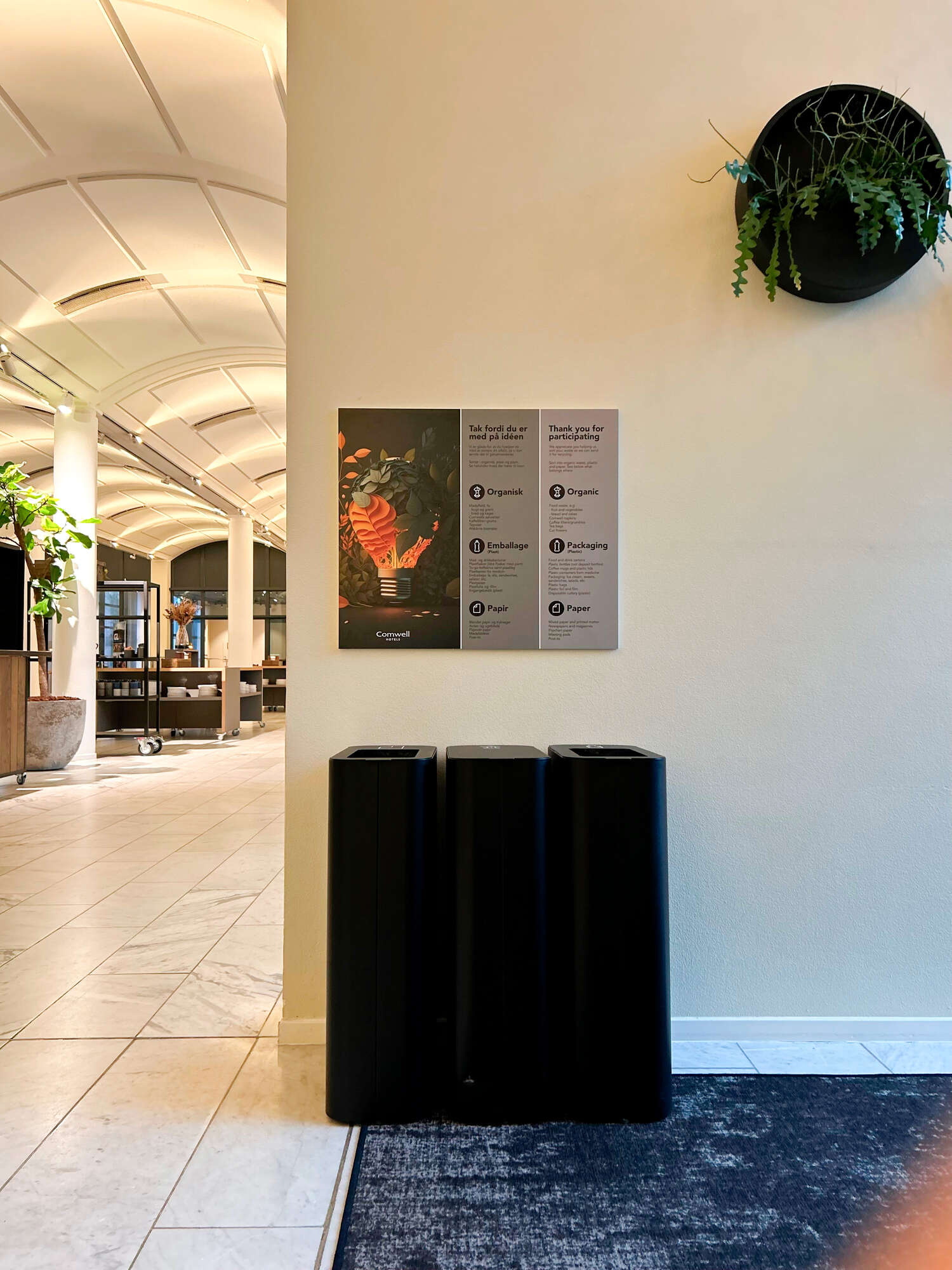Environmental

The best version of ourselves
The world is calling for proactive actions and better solutions when we as a responsible hotel chain want to make a positive impact on climate change, environmental pollution and disappearing biodiversity. And in a world that is constantly changing and demanding more and more sustainability, we, as one of the leading actors in the Danish hotel industry, have an obligation to not only keep up, but also a desire to help set the direction for a better future.
It's a journey without a final destination. Partly because external requirements and standards are constantly made stricter and more demanding, and partly because we ourselves are becoming more skilled and developed which allows us to do things better, smarter and more efficiently.

Comwell has committed to SBTi
SBTi is one of the highest standards for companies that want to set ambitious and binding goals to reduce greenhouse gas emissions. We are the first hotel chain in Denmark to join SBTi, as Comwell Hotels is working in an integrated way with sustainability and taking purposeful steps in the journey towards carbon neutrality. We are working ambitiously to achieve a number of defined goals, and with this endorsement we have committed to a number of specific objectives that will lead us to carbon neutrality in our own operations by 2030 and in the entire value chain by 2040.
The Science Based Targets initiative (SBTi) is based on the Greenhouse Gas Protocol and is founded by the UN Global Compact (UNGC), CDP, World Resources Institute (WRI) and World Wildlife Fund (WWF). It is a non-profit initiative that focuses on close collaboration between companies and climate experts to ensure that each company's climate goals are aligned with climate science.

The SBTi-affiliated companies, including Comwell Hotels, have committed to reduce 167 million tons of CO2 by 2030. This is equivalent to four times the annual emissions of Denmark. Overall, Denmark ranks second highest in the number of companies that have joined SBTi - only surpassed by Switzerland. This emphasizes Danish companies' focus on sustainability and specifically their contribution to achieve the goals of the Paris Agreement.
Energy
We constantly focus on the fine balance between optimizing and reducing our consumption while ensuring that our guests do not experience a compromise in the service they purchase. For many years, we have been focusing on investing in energy-saving solutions out of a desire to take responsibility for our resource consumption.
Along with other things, we do this in the following ways:
Our monthly records of electricity, water and heating consumption are shared internally among the managers of hotel property, so we keep a constant focus on the consumption of energy. Therefore, we have invested in a new system that collects all data, making it easier to keep an close eye on the consumption.
Overall, we're up to almost 80% when we look at how many of our light sources are now switched to LED - and we're constantly striving to increase the percentage. We have also invested in certified environmentally friendly electricity from Nordic wind turbines, which covers all our consumption.
Over the coming years, we will be replacing the armature in our taps in the rooms, which will save 34% of the water consumption. We have also invested in energy optimizations, such as dishwashers, which provide savings on water, electricity, soap consumption as well as a reduction in CO2 emissions.
Waste
At Comwell Hotels, we sort and recycle waste like never before. And to become even better at recycling waste, we've implemented new waste solutions in our meeting areas and rooms. This means that we no longer have waste bins in our smaller meeting rooms and group rooms.
Instead, our guests will find waste stations in the common areas and meeting corridors. The waste stations are divided for organic waste, paper and plastic.

We have also removed the waste bins in the rooms and set up waste sorting stations in the hallways. However, in the bathrooms, guests will still find small bins for toiletries.
We can see that our increased focus on recycling both in guest areas and in our department stores, where we implemented waste sorting into 10 fractions in 2022, has had a positive effect on our recycling rate - this has increased from 33.3% in 2022 to 40.7% in 2023. Food waste is not included in the recycling rate as it is measured separately.
Read more about:
In addition to sorting our waste, we do our best to recycle as much as possible. In 2022, we started recycling milk cartons at nine of our hotels, where they were sorted as cardboard and sent for recycling instead of ending up in residual waste. We have now completed the implementation of the process in all hotels, and we have also started sorting out all broken porcelain. This can now be reused in building materials, among other things.
Our waste is collected by external partners who help us gain insight into our recycling rate through monthly reporting. With this data, we learn more about our hotel operations so that we can take the right steps towards our goals in the most enlightened way possible.
At Comwell, we are continuously working to optimize the processes at our hotels so they all reflect our focus on sustainability and greener hotel operations.
The butter pieces in our buffet have been phased out and canned chickpeas have been replaced with vacuum-packed bags. These are just some of the smaller phase-outs that make a big difference in terms of weight savings in production and post-production processing.
Minimizing waste sorting and recycling is also a priority at Comwell, which is partly achieved by reusing butcher boxes, while styrofoam and foam boxes are replaced with reusable cardboard and boxes in recycled plastic.
Achieved 2024
Goal 2025
Goal 2030
Stop food waste
At Comwell, we cry over spilled milk. Anything that ends up in the garbage bin is more than just food waste - it's a waste of resources. The journey from farm to fork is long, and resources are used to grow, process and transport many of our supplies. For this reason, Comwell's work with excess food cannot be isolated solely to what goes in the bin.
This is also reflected in the way we work:
In collaboration with our suppliers, we have set up a measurement design that enables a detailed overview of which food is thrown away. This data is then used to plan production, so we can get ahead of our surplus food. Since we started measuring in 2018, we have reduced our food waste by 25% and we are constantly striving to do better. By 2030, our goal is to have no more than 15% waste.
The implementations that are visible to the customer are for an instance evident in our buffets at the hotels. Among other things, we work with portioning, which, in addition to creating a better experience, also benefits our reduction of surplus food. Specifically, this means that we use smaller plates and dishes, which instead are filled more often by the staff. In addition, our skilled chefs turn food into new dishes - a freshly baked rye bread can easily be transformed into delicious muesli or "øllebrød".
In collaboration with external partners, Comwell continuously trains employees in food waste and raw material utilization. It is important that our kitchen staff are equipped with the right skills in the form of training, inspiration and knowledge sharing, as they are the ones who are actively driving our work on food waste.
That's why we aim for the majority of our kitchen staff to complete our Green Chef education, which focus on food waste, plant-rich diets, CO2 emissions and raw material utilization. In 2023, we completed two four-day classes and we look forward to welcoming more enthusiasts to the green kitchen.
Read more about our Green Chef education: Green Chef-uddannelsen
“Something really beautiful happens in the kitchen in the meeting between chefs, wholesalers and small producers who have a passion. Everyone is motivated and inspired to take responsibility for the 'green movement' when you stand there on the training floor and are at eye level”
Marlene Lindegaard, Concept Manager at Dagrofa Foodservice
Strategic partnerships make us stronger, also when it comes to reducing food waste. In this context, Comwell Hotels has entered into a strategic partnership with, among others, Denmark's largest social food waste organization, Stop Spild Lokalt, and therefore also engages in the great social work that the food waste organization ensures and stands for.
Biodiversity and increased awareness of our nature and the raw materials that grow and live there are top priorities at Comwell. Also in relation to reusing raw materials and surplus food.
Since 2016, Comwell Hotels has been part of the trust-based scheme, REFOOD, for companies and organizations in the food and service sector that actively work to increase the amount of recycling.
Every quarter, we also work with statistics on how much organic waste is sent to be recycled - all to keep track of the development and ensure that we constantly keep the environmental impact as low as possible.
Ethics, health and taste go hand in hand, and working with biodiversity, better conditions for animals and naturally grown vegetables are also important focus points for us. That's why we are proud to have a bronze label in connection with the Organic Food Label. This means that 30-60% of our food and beverages at the hotels are organic.